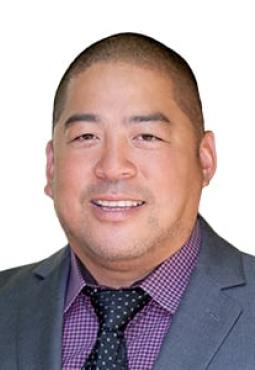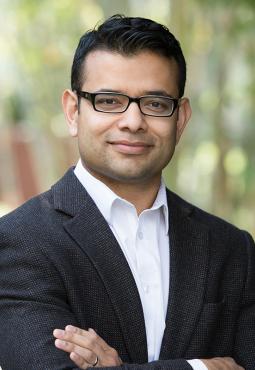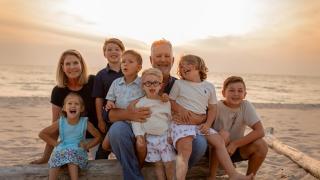Patty and Mark Loeffler, both 66, live active lives in Rancho Mirage, California. They are enthusiastic hikers and golfers, and they love to travel — especially to visit their seven grandchildren several states away.
The Loefflers are also both living with Stage 4 cancer.
In 2020, after Patty discovered blood in her urine, a urologist friend urged her to see a specialist as soon as possible. At the height of the pandemic, it was a challenge.
But that August, tests confirmed the couple’s fears: renal cell carcinoma. They visited several hospitals, but were told it would be at least three months before Patty could have surgery.
Mark was so frustrated, he decided to make a “cold call” to City of Hope’s main line. “I told them we wanted to see the urology department chair. To my surprise, not only were we able to see him within a week, but Patty was able to have her surgery within two weeks. It started a profound journey for us,” he said.
Urologic surgeon Clayton Lau, M.D., Pauline & Martin Collins Family Chair in Urology, along with medical oncologist Sumanta “Monty” Pal, M.D., became Patty’s main care providers.
Lau performed robotic-assisted surgery to remove Patty’s right kidney. Surgeons at City of HopeÒ have performed more than 16,000 robotic-assisted procedures. This includes more than 3,300 robotic kidney surgeries.
After Patty recovered, the couple visited Lau’s office for the pathology results. But the pandemic meant Mark had to stay outside. “I was scared and alone,” Patty recalled. “Dr. Lau said, ‘No problem, we’ll use FaceTime to put Mark right in here with us.’”
Lau explained that her cancer was Stage 1; no surrounding tissues were affected.
Patty started seeing Pal for follow-up scans and bloodwork every three months. Over time, nodules were spotted on her lungs, a location where renal cell carcinoma can spread. Still, they were not large enough to biopsy, and Pal clarified that lung nodules aren’t always cancer.
Another shock — and a new kind of teamwork
By early 2022, Mark continued to be focused on Patty’s health and his work in corporate finance leadership. He also needed surgery to repair his Achilles tendon.
Preoperative testing showed his prostate-specific antigen (PSA) levels were elevated. His physician advised having the surgery and then seeing a urologist as soon as he could.
“The urologist identified a mass on my prostate,” Mark said. “Immediately, I knew I was going to contact Dr. Lau.”

At City of Hope, a magnetic resonance imaging scan showed a 2.5-centimeter tumor. After biopsy, what seemed unthinkable was confirmed: Stage 4A prostate cancer that had spread to several lymph nodes.
Now, Lau and Pal would see the Loefflers together as a couple, “down to scheduling all our appointments on the same day,” Mark said.
Pal advised hormone therapy to lower testosterone levels and slow the cancer’s growth. He also arranged 36 sessions of targeted radiation therapy at a center closer to the Loefflers’ home.
Soon after starting hormone therapy, Mark experienced an onslaught of side effects: hot flashes, pain, sleeplessness and extreme fatigue. “It was very troubling,” he said. “And me being lethargic is a big issue with my work.”
Pal recommended Mark work with supportive care specialist Sari Williams, R.N., FNP-C. “Sari became my manager,” Mark said.
Support when it’s needed most
The Department of Supportive Care Medicine offers integrated care for physical and emotional issues that can arise during treatment. Services include physical and occupational therapy, counseling, support groups and spiritual care.
Williams worked with Mark to come up with a strategy to address his side effects. Although hormone therapy was causing the hot flashes, the dose was standard of care and couldn’t be changed.
“It was Mark who found a medication that is newly FDA-approved for postmenopausal women having hot flashes. Clearly, that doesn’t pertain to him,” said Williams. “Does that mean we can’t use it?”

Williams and her supervising physician determined they’d need to petition to have Mark’s insurance company cover the medication. “If they are willing, it’ll help a lot of prostate cancer patients,” she said. They continue to work on that process.
Managing the fatigue was next. Williams recommended good sleep hygiene and aerobic exercise. “We’ve adjusted sleep aids back and forth,” she said. “We have to follow guidelines, but we also think outside the box. For him, the side effects are so profound, and I’m more driven to help him.”
After Mark’s work with Williams, Pal recommended periodic hormonal treatment breaks. The cancer responded well, and now, his PSA levels are undetectable.
“We always have to do a sensitive balance: the clinical benefit from these therapies against the side effects,” Pal said. “The hot flashes were really impeding his quality of life.” Pal continues to monitor Mark’s PSA levels as he recuperates.
A Setback — and a Solution
But the Loefflers faced another challenge: In June, a computed tomography scan confirmed that the nodules in Patty’s lungs had started to grow rapidly. The couple was set to leave for Michigan to be with their grandkids for the summer when Pal convinced them to stay long enough for Patty to undergo a lymph node biopsy.
Pal called when they were on the road. The lymph node had tested positive. Patty’s cancer was now Stage 4. He asked them to return so Patty could start treatment. Patty balked. They negotiated, agreeing to return in two weeks.
Pal advised a combination of cabozantinib (Cabometyx), a targeted therapy that blocks a protein that helps cancer cells multiply, along with a monoclonal antibody drug that helps the immune system recognize and destroy the cancer cells.
Patty experienced intense side effects: nausea, vomiting, fatigue and a painful condition known as hand-foot syndrome that causes swelling and redness. Pal worked to adjust the treatment dose.
At their next appointment, Patty said, “He could tell I was upset. He said, ‘I have a patient with renal cell carcinoma who was given six months to live — 11 years ago. He’s in the room next door. Do you want to meet him?’”
Mark recalled, “We go into the room, and there’s this big, strapping man. He had a rare form of renal cell carcinoma. Right after his visit, he was going on a motorcycle trip to Denver! That was one of those divine moments.”
The man shared three things that had helped him — things that hit home for the Loefflers. “It’s our commitment to our faith,” said Mark. “We live very intentional lives. Second is family. Third, trust your physician.”
Patty has since started her own supportive care plan with Joseph Vega, D.O., assistant clinical professor in the Department of Supportive Care Medicine. Vega suggested several side effect management strategies. Williams works with Patty as well.
When asked what keeps her going, Patty laughed: “Mark.”
“The case of Mark and Patty is so unique,” said Pal. “Usually, one can lean on the other, but now with two people going through it at the same time, imagine the conundrum. But they are dealing with it beautifully. They ask more questions about each other than themselves.”
Mark’s father was a physician. “I know how people get put into systems,” he said. “City of Hope is the antithesis of that. At the worst moments, our most fearful times, Dr. Lau would put his arms around us and tell us we are going to get through this together. It’s just part of who they are — Dr. Lau, Dr. Pal, Sari — everyone.”
The Department of Supportive Care Medicine at City of Hope was the first in the United States to fully integrate across supportive care specialties and into the patient’s clinical care and is one of the largest programs of its kind today. The program provides cancer patients with comprehensive physical, psychological, social and practical support services, including care navigation; survivorship programs; specialists in cancer and aging; child life specialists; psychological and spiritual counseling; pain management; integrative medicine, such as yoga, massage and meditation; and more — all with a focus on maximizing patient and family strengths, quality of life and the ability to best engage in their treatment journey and beyond. Thanks to a gift from The Sheri and Les Biller Family Foundation, City of Hope is working to expand this offering across its cancer care system and to advocate for establishing supportive care as a standard best practice for cancer care in the United States.
Main image: The Loefflers with their grandchildren.
